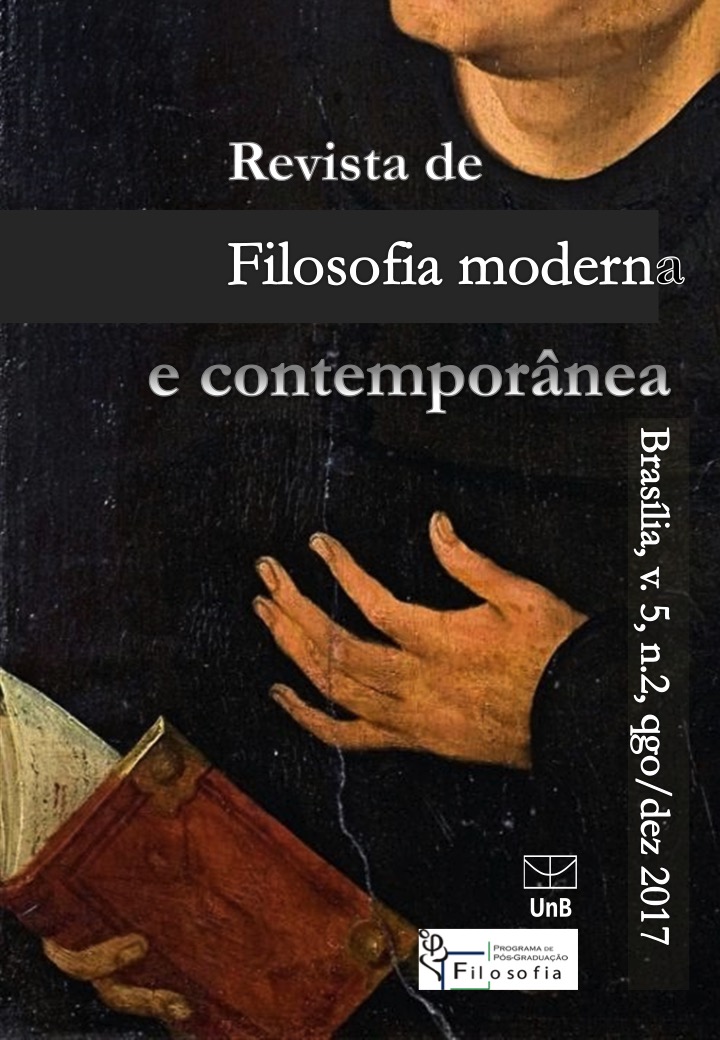Liberdade e vontade: Schelling, leitor de Lutero
DOI :
https://doi.org/10.26512/rfmc.v5i2.12588Mots-clés :
Liberdade, Vontade, Schelling, Lutero, Deus, Ser humanoRésumé
After a general introduction to the subject, a fundamental problem is identified for any comparative study of Schelling and Luther, namely the issue of necessity and freedom in the understandings of both human being and God. In this connection, a discussion ensues concerning, first, he concept of human beings as free and grounded their own will. This step brings to light the anthropological and ethical core into which positive theology and speculative philosophy may prima facie converge. Varying specificities and assumptions are also detected insofar as they both bring near, and keep apart, Luther’s and Schelling’s perspectives as they arise from their different contexts and interests. Among those assumptions is the struggle for the specific contours and place of the concept of God as it moves, noticeably so in the case of Schelling, between theism and a pantheism of freedom and the will. Eventually the conclusion is drawn that Schelling’s stance, though close enough to Luther’s, reflects a rather indirect reading which, concerning the essentials, goes well beyond the latter’s starting point and goal.
Téléchargements
Références
BENZ, E.Schellings theologische Geistesahnen. Abhandlungen der Geistes-und Sozialwissenschaftlichen Klasse ”“ Akademie der Wissenschaf-ten und der Literatur 1955/Nr. 3. Wiesbaden: Steiner, 1955.
BORNKAMM, H.Luther und Böhme.Bonn: Marcus und Weber, 1925.______.Luther im Spiegel der deutschen Geistesgeschichte. Heidelberg:Quelle & Meyer, 1955.
DEWS, Peter. “Theory construction and existential description in Schel-ling’s treatise on freedom”.British Journal for the History of Philo-sophy, v. 25, n. 1, p. 157”“178, 2017.
DREHER, L. H. “Dependência e liberdade: Schleiermacher, Schelling eos modos da relação com o Absoluto”.Numen, Juiz de Fora,v. 7,n. 2, p. 59-77, 2004, jul.-dez.
EBELING, G.O pensamento de Lutero: uma introduçãoSão Leopoldo:Sinodal, 1988.
EGLOFF, L.Das Böse als Vollzug menschlicher Freiheit: Die Neuausri-chtung idealistischer Systemphilosophie in Schellings Freiheitsschrift.Berlin; Boston: de Gruyter, 2016.
FICHTE, J. G.Sämmtliche Werke.Hg. I. H. Fichte. 8 v. Berlin: Veit & Comp., 1845/1846.
FUHRMANNS, H. Schellings letzte philosophie. Die negative und positive Philosophie im Einsatz des Spätidealismus.Berlin: Junker undDünnhaupt, 1940.
______. “Einleitung”. In: SCHELLING, F. W. J.Über das Wesen dermenschlichen Freiheit. Stuttgart: Reclam, 1977, p. 3-38
GROSSHANS, H.-P.“Fé e razão segundo Lutero: a luz da razão no cre-púsculo do mundo”. In: HELMER, C. (Ed.)Lutero:um teólogo paraos tempos modernos. Trad. G. Korndörfer. São Leopoldo: Sinodal; EST, 2013, p. 197-212.
HARE, J. E.The moral gap: Kantian ethics, human limits, and God’s assis-tance.Oxford; New York: Clarendon Press ; Oxford UniversityPress, 1996.
HEGEL, G. W. F.Vorlesungen über die Geschichte der Philosophie. In:Werke. Bd. 20. Frankfurt a. M.: Suhrkamp, 1986.
HENRICH, D. “Andersheit und Absolutheit des Geistes: Sieben Sch-ritte auf dem Wege von Schelling zu Hegel”. In : Selbstverhältnisse. Stuttgart: Reclam, 1982, p. 142”“72.
HESSEN, J.Lutero visto pelos católicos.2. ed. Coimbra: ArménioAmado, 1951.
HIRSCH, E.Geschichte der neuern evangelischen Theologie im Zusamme-nhang mit den allgemeinen Bewegungen des europäischen Denkens.Bd. 4. Gütersloh: Gerd Mohn, 1952.
HOLL, K.Gesammelte Aufsätze zur Kirchengeschichte. Bd. 1: Luther.Tübingen: Mohr, 1948.
HORSTMANN, R.-P.Die Grenzen der Vernunft. Eine Untersuchung zuZielen und Motiven des Deutschen Idealismus. 3. Aufl. Frankfurt a.M.: Klostermann, 1991/2004.
KANT, I.Fundamentação da Metafísica dos Costumes.Lisboa: Edições 70,1948/2007.
______.A religião nos limites da simples razão.Lisboa: Edições 70, 1992.
KILE, F. O.Die theologischen Grundlagen von Schellings Philosophie derFreiheit. Leiden: Brill, 1965.
LIMA VAZ, Henrique Cláudio de, Senhor e escravo: uma parábola doa filosofia ocidental,Síntese, v. 8, n. 21, 198, p. 7-29.
LUTERO, M. A Epístola do Bem-aventurado Apóstolo Paulo aos Roma-nos Inicia (1515/1516). In:Obras Selecionadas.V. 8: InterpretaçãoBíblica. Princípios. Porto Alegre; São Leopoldo: Concórdia; Sino-dal, 2003a, p. 254-330.
______. Da vontade cativa (1525). In:Obras Selecionadas.V. 4: Debates eControvérsias, II. Porto Alegre; São Leopoldo: Concórdia; Sinodal,1993, p. 11-216.
______.D. Martin Luthers Werke. Kritische Gesamtausgabe. Weimar:H. Böhlaus Nachfolger, 1883-2009.
______. Prefácio à Epistola de S. Paulo aos Romanos (1522/1546). In:Obras Selecionadas.V. 8: Interpretação Bíblica. Princípios. PortoAlegre; São Leopoldo: Concórdia; Sinodal, 2003b, p. 129-141.
______. Tratado sobre a liberdade cristã (1520). In:Obras Selecionadas.V. 2: O Programa da Reforma. Escritos de 1520. Porto Alegre; SãoLeopoldo: Concórdia; Sinodal, 1989, p. 435-460.
PINOMAA, L. Sieg des Glaubens: Grundlinien der Theologie Luthers. Göt-tingen: Vandenhoeck & Ruprecht, 1964.
HÜHN, H. “Wille. III. 19. und 20. Jh. ”“ A. Idealismus und Nachidealismus”. In:RITTER, J. ET ALII (Hrsg.) Historisches Wörterbuchder Philosophie. Bd. 12. Basel: Schwabe, 2004.
POTHAST, U.Freiheit und Verantwortung. Eine Debatte, die nicht sterbenwill-und auch nicht sterben kann. Frankfurt am Main: Klostermann, 2011.RITSCHL, Albrecht. Geschichtliche Studien zur christlichen Lehre vonGott. In:Gesammelte Aufsätze. Neue Folge. Freiburg i. Br.; Leipzig: J. C. B. Mohr (Paul Siebeck), 1896, p. 76-89.
RÖD, W.Benedictus de Spinoza. Eine Einführung.Stuttgart: Reclam,2002.
SCHELLING, F. W. J. Sämmtliche Werke. Hrsg. von K. F. Schelling.Stuttgart und Augsburg: Cotta, 1856-1861.
______. Investigações filosóficas sobre a essência da liberdade humana e os assuntos com ela relacionados. Trad. C. Morujão. Lisboa: Edições70, 1993.
______.Philosophie der Offenbarung 1841/42. Hrsg. M. Frank. Frank-furt a. M.: Suhrkamp, 1977.
SCHULZ, W.Die Vollendung des deutschen Idealismus in der Spätphilo-sophie Schellings.2. Aufl. Pfullingen: Neske, 1975.
SPINOZA, B. Ethica. In Opera. Lateinisch und deutsch. Hrsg. K. Blu-menstock. 2. Aufl. Darmstadt: Wissenschaftliche Buchgesells-chaft, 2011, p. 84-557.
STEINVORTH, U.Freiheitstheorien in der Philosophie der Neuzeit.2.Aufl. Darmstadt: Wissenschaftliche Buchgesellschaft, 1994.THEUNISSEN, Michael. “Schellings Anthropologischer Ansatz”. Archiv für Geschichte der Philosophie, v. 47, 1965, p. 174-189.
TROELTSCH, E.El protestantismo y el mundo moderno.3. ed. México:Fondo de Cultura Económica, 1924/1967.
WINDELBAND, W. Lehrbuch der Geschichte der Philosophie. 6. Aufl.Tübingen:J.C.B. Mohr, 1892.
ZELTNER, H. Schelling-Forschung seit 1954.Darmstadt: Wissenschaf-tliche Buchgesellschaft, 1975.
Téléchargements
Publié-e
Comment citer
Numéro
Rubrique
Licence
Direitos Autorais para artigos publicados nesta revista são do autor, com direitos da primeira publicação para a revista. Em virtude dos artigos aparecerem nesta revista de acesso público, os artigos são de uso gratuito, com atribuições próprias, em aplicações educacionais e não-comerciais.


